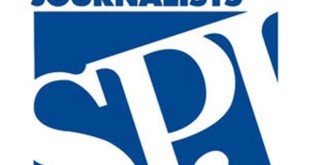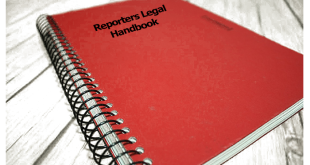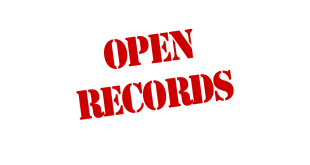3B: Subpoenas Under State Law
3B1: Nevada’s Shield Law
Nevada’s Shield Law, NRS §49.275 is one of the strongest in the nation.
It states:
No reporter, former reporter or editorial employee of any newspaper, periodical or press association or employee of any radio or television station may be required to disclose any published or unpublished information obtained or prepared by such person in such person’s professional capacity in gathering, receiving or processing information for communication to the public, or the source of any information procured or obtained by such person in any legal proceedings, trial or investigation:
1. Before any court, grand jury, coroner’s inquest, jury or any offer thereof.
2. Before the legislature or any committee thereof.
3. Before any department, agency or commission of the state.
4. Before any local governing body or committee thereof, or any officer of a local government.
The protection provided by this statute is extremely broad. District
Court Judges and Justices of the Peace have repeatedly quashed subpoenas by both defense and prosecution in criminal cases, as well as by parties in civil matters. As it is written, the statute does not require the press to testify even about those matters which have been published.
3B2: Can You Give up Your Shield Law Protection?
In the past, the Nevada Supreme Court had held that a reporter could waive the Shield Law privilege by revealing, in a non-protected manner, information otherwise privileged. Newburn v. Howard Hughes Medical Institute, 95 Nev. 368, 594 P.2d 1146 (1979). The only requirement was that the waiver must have been intentional, and that the waiver would only be valid to the extent specific information was revealed. Las Vegas Sun v. District Court, 104 Nev. 508, 761 P.2d 849 (1988). Under this previous law, if you had given up certain specific information (for example, by trading information with the police), you could have been forced to testify about that particular item; but you wouldn’t have given up the privilege as to any other information about the case which you had not revealed. However in 2000, the court in Diaz v. Eighth Judicial Dist. Court, 116 Nev. 88 (2000), overruled Newburn, supra, and held that the Nevada Waiver statute, NRS §49.385, does not apply to the News Shield statute, NRS §49.275. In other words, journalists can not waive their privileges under the News Shield statute. Thus, under current Nevada law, a journalist does not waive any rights or privileges by publication because the privileges of the News Shield statute include any published or unpublished source.
3C: Subpoenas Under Federal Law
While there is neither a federal Shield Law nor an absolute constitutional privilege against testimony compelled from reporters, there are a number of objections to subpoenaing reporters in federal courts. They include quite strict requirements in a First Amendment test, as well as internal government restrictions which prohibit the use of the press as involuntary witnesses in all but the most compelling circumstances. In addition, Nevada’s state law privileges apply to those claims in federal court which arise under Nevada law.
3C1: The Branzburg Constitutional Privileges
Nevada’s federal courts have applied the limited First Amendment privilege for reporters found in the “Branzburg trilogy.” In Newton v. National Broadcasting Co. Inc., 109 F.RD. 522, 527 (D. Nev. 1985), Judge Philip Pro recognized that a party seeing a reporter’s testimony must demonstrate that:
1.) The testimony is highly relevant;
2.) The party has a compelling need for the testimony; and
3.) The party seeking the testimony has exhausted other means of getting it.
While this standard does not constitute an absolute privilege it is sufficient to overcome most requests for press testimony in federal court, especially in those cases where the reporter or media entity is not a party.
It is made even stronger by other barriers to testimony including internal regulations of the Department of Justice.
3C2: Regulation Governing Subpoenas By The U.S. Government
In response to past governmental abuse of the subpoena power against the press, the Attorney General in 1973 issued guidelines found at 28 CFR §50.10. Those guidelines must be met by a federal prosecutor who seeks involuntary testimony from a member of the press. They provide that no subpoena may be issued without the personal approval of the Attorney General, to whom a request may be made only if:
1.) The testimony sought is essential to a successful investigation; and
2.) The government has attempted to obtain the information from alternative non-media sources.
In addition, the use of subpoenas should, absent exigent circumstances be limited to verification of published information, and even subpoena requests for publicly disclosed information should be treated with care.
The rules found in 28 CFR §50.10 create a legal right enforceable by the press. United States v. Blanton, 534 F. Supp. 295, 297 (S.D. Fla. 1982). In addition to those federal standards, where a claim in federal court is based on state law, state privileges, including the Shield Law, apply to protect the press against testifying.
3C3: Application Of State Law Privileges
F. R. E. 501 provides the privileges of a witness in a civil action, with respect to an element of a claim or defense based on state law, are determined in accordance with state law. In Newton, supra, Judge Pro recognized that to the extent a party derives claims or defense from Nevada law, our state’s extremely strong Shield Law provides an absolute testimonial privilege for the press.
 Nevada Press Association The best in Nevada journalism since 1924
Nevada Press Association The best in Nevada journalism since 1924


